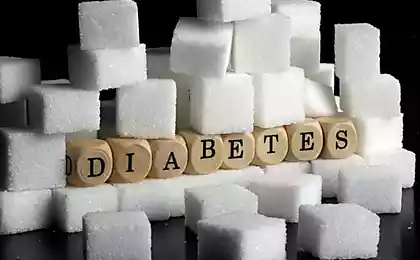853
5 compelling arguments against the vegan diet
There is no single method of supply is equally suitable for all - everyone is different and what works for one person does not have to be approached differently. Personally, we stand for the power of both vegetable and animal food, and there is plenty of evidence that it is reasonable.

However, vegans often claim that people should be excluded from the diet all animal products. No, we have nothing against vegetarians or vegans: if you want to eat it and thus feel good, it's great! Continue in the same spirit, why not? But to lie and intimidate to persuade everyone else to eat as well - it is not entirely correct. In the end, and vegan diet has a number of drawbacks.
For example:
1. vegans are deficient in many important nutrients
People are omnivorous. We can eat as products of animal and vegetable origin. There are nutrients that may be derived from plants (e.g., vitamin C) and others which can only be obtained from animals.
Vitamin B12 - water-soluble vitamin involved in the work of every cell in the body, it is especially important for blood formation and the functioning of the brain. Since B12 is essential for life and is not found in the required amount in the plants (except for certain species of algae), vegans often have a lack in it: one study says that 92% of vegans lack of this substance in the body.
But B12 - this is only the tip of the iceberg. There are other lesser-known nutrients found only in animal products and are crucial for the optimal functioning of the body.
Here are some examples:
- Animal protein contains all the essential amino acids in the right ratio - this is important for the growth of muscle mass and bone health. Vegans do not receive any animal protein.
- Creatine helps to create a reserve of energy in cells. Studies show that vegetarians are deficient in creatine.
- Carnosine protects from various degenerative processes in the body and can be protected from aging. It is found only in animal products.
- Docosahexaenoic acid (DHA) is the most active form of omega-3. It contained mainly in foods of animal origin. The same substance derived from plants not so efficiently converted in the body into DHA.
Vegans can object: but animal products are rich in saturated fats and cholesterol.
Cholesterol is an essential molecule in the body and each part of the cell membrane, it is also necessary for the production of steroid hormones such as testosterone. Research shows that consumption of saturated fat is correlated with increased levels of testosterone. Not surprisingly, vegans and vegetarians tend to have significantly lower levels of testosterone than the meat-eaters.
Outcome: strict vegans are deficient in many important nutrients, including vitamin B12 and creatine. Studies confirm that vegans had significantly lower levels of testosterone compared to meat-eaters.
2. There are no studies proving that a vegan diet is better than others
Despite the claims of supporters of a vegan diet, there are no controlled studies to prove that this method is better than any other food. They often claim that a low carbohydrate, high fat content in the diet (as opposed to the vegan diet) is dangerous and that these data prove its superiority.
But where is the evidence?
In one experiment, we compared the Atkins diet (low-carbohydrate high-fat) diet with Ornish (low fat, almost vegetarian). This study clearly demonstrates that the Atkins diet is improving in almost all the criteria of health, although not all of them were statistically significant:
- Atkins group lost more weight: on average, each subject dropped 5 kg, while the Ornish group lost 2, 5 kg.
- The Atkins group there was a decrease in blood pressure.
- Under the Atkins increased high-density lipoprotein ("good" cholesterol).
- Under Atkins was a greater decrease triglyceride: 29, 3 mg / l, compared with 4, 9 mg / l.
In addition, to increase until the end of the Atkins diet was easier though, because it is easier to stick to. Thus, the Atkins diet had several important advantages over the Ornish diet.
Further, there are some studies proving the health benefits and the reduction of mortality among vegans and vegetarians, for example, studies of Seventh-day Adventist Church. The problem is that these studies can be called more observations - they show only the changes, but do not show the reasons.
Vegetarians are healthier, perhaps because they take better care of their health in general, eat more vegetables, less likely to smoke and more likely to engage in physical exercise - it has nothing to do with avoiding animal products. In another study conducted among 10 thousand people as vegans, meat eaters and who care about their health, no difference in mortality was observed.
A controlled experiment has shown that a vegan diet is more effective against diabetes than the official diet recommended by the American Diabetes Association. However, the low-carb diet has also been studied in the same way and showed a much more powerful positive effect.
Bottom line: Despite all the propaganda, there is no evidence that a vegan diet is better than other diets, as confirmed by research.
3. Supporters vegan diet used lies and intimidation to promote their views
Some supporters of the vegan diet is not too honest when trying to convince others of the merits of its approach to food: they are actively using the lies and intimidation to scare people away from fats and animal products.
Despite the propaganda, in fact, there is no evidence that meat, eggs or animal nutrients, which contain saturated fats and cholesterol, cause harm. People promoting vegan diet should be more honest and do not use scare tactics and lies to make people feel guilty because of the consumption of animal products, which are very healthy food.
I would like to briefly mention the Chinese study, promotes veganism and to "prove" that it is - the right choice. This was an observational study, conducted by scientists, madly in love with his theory: he picked the data that supported his conclusions, and ignored those that they did not fit. As a result, the results of the study have been completely debunked. For more information, you can explore the following:
- Denise Minger (Denise Minger) «Chinese study - facts or delusion»;
- Chris Masterdzhon (Chris Masterjohn) «The fact that Dr. Campbell will not tell you Chinese study».
In addition, in the same China has recently been carried out new research, directly contradicting previous: men regularly eat red meat, the risk of cardiovascular disease, and women - the risk of cancer.
Outcome: proponents of veganism often use fear mongering tactics and intimidation to persuade people not to eat animal products. They are often referred to as evidence of the Chinese study, which was fully exposed.
4. vegan diets may work in the short term
If you go to any vegan, you are there quickly find stories of people who started to adhere to a vegan diet and realize its amazing health benefits. There is no reason to believe that all these people are lying, but it is important to keep in mind that these figures - are unofficial. This is not science.
You will find the same success story on almost any diet. And, you can find stories of people who have vegan diet will end up with a terrible result. Yes, we believe that a vegan diet has a number of benefits for the health of many people - but in the short term, before the run short of some nutrients.
A vegan diet is not simply recommends avoiding animal products, but also sugar, refined carbohydrates, processed vegetable oils and trans fats, then people are advised to stop smoking and start exercising - there are too many confounding factors that can easily explain the positive effects.
These products - really junk food, in this we agree with the vegan and rejection of them entails significant advantages. However, plant-based diet, including a bit of animal products (eg, whole egg or fat fish) will be much more useful in the long run than a diet excluding animal products entirely.
The result: a strictly vegan diet also recommends avoiding the use of sugar, refined carbohydrates, vegetable oils and trans fats. This probably is the reason for the health benefits, rather than the total exclusion of animal products.
5. Fully objective reason to avoid animal products is not
People ate meat for hundreds of thousands (or even millions) of years - we have evolved. Our bodies are quite capable to digest, absorb and make full use of a variety of useful substances contained in foods of animal origin.
It is true that the pesticide-treated meat is harmful and that the way animals are treated today, not too well. However, animals that feed on natural products (eg, cows must be fed grass) and those who are fed on farms unclear what - it's not the same thing.
Processed meats harm, as confirmed by many studies, but this does not apply to natural, unprocessed meat. Raw red meat actually has no connection with cardiovascular disease, diabetes, or risk of death. There is only a very weak correlation with increased cancer risk, and this is probably due to excessive consumption of food, and not the meat.
Contact saturated fat with heart disease has also not been proved. The study, which was attended by nearly 350 thousand people did not find literally no connection between the consumption of saturated fats and cardiovascular diseases.
Research eggs also have not confirmed the rumors about their negative impact on health. Several long-term studies, conducted relatively frequent consumption is extremely rich in cholesterol eggs, did not reveal any adverse effects.
The fact that animal products - meat, fish, eggs and dairy products - for those who do not have them you are hypersensitive, very nutritious. They contain high-quality protein, healthy fats, vitamins, minerals and a variety of lesser-known nutrients that have a significant impact on human health.
Bottom line: The only reason that you can refuse the use of animal products, are aesthetic or religious beliefs, but no scientifically based evidence for that.

However, vegans often claim that people should be excluded from the diet all animal products. No, we have nothing against vegetarians or vegans: if you want to eat it and thus feel good, it's great! Continue in the same spirit, why not? But to lie and intimidate to persuade everyone else to eat as well - it is not entirely correct. In the end, and vegan diet has a number of drawbacks.
For example:
1. vegans are deficient in many important nutrients
People are omnivorous. We can eat as products of animal and vegetable origin. There are nutrients that may be derived from plants (e.g., vitamin C) and others which can only be obtained from animals.
Vitamin B12 - water-soluble vitamin involved in the work of every cell in the body, it is especially important for blood formation and the functioning of the brain. Since B12 is essential for life and is not found in the required amount in the plants (except for certain species of algae), vegans often have a lack in it: one study says that 92% of vegans lack of this substance in the body.
But B12 - this is only the tip of the iceberg. There are other lesser-known nutrients found only in animal products and are crucial for the optimal functioning of the body.
Here are some examples:
- Animal protein contains all the essential amino acids in the right ratio - this is important for the growth of muscle mass and bone health. Vegans do not receive any animal protein.
- Creatine helps to create a reserve of energy in cells. Studies show that vegetarians are deficient in creatine.
- Carnosine protects from various degenerative processes in the body and can be protected from aging. It is found only in animal products.
- Docosahexaenoic acid (DHA) is the most active form of omega-3. It contained mainly in foods of animal origin. The same substance derived from plants not so efficiently converted in the body into DHA.
Vegans can object: but animal products are rich in saturated fats and cholesterol.
Cholesterol is an essential molecule in the body and each part of the cell membrane, it is also necessary for the production of steroid hormones such as testosterone. Research shows that consumption of saturated fat is correlated with increased levels of testosterone. Not surprisingly, vegans and vegetarians tend to have significantly lower levels of testosterone than the meat-eaters.
Outcome: strict vegans are deficient in many important nutrients, including vitamin B12 and creatine. Studies confirm that vegans had significantly lower levels of testosterone compared to meat-eaters.
2. There are no studies proving that a vegan diet is better than others
Despite the claims of supporters of a vegan diet, there are no controlled studies to prove that this method is better than any other food. They often claim that a low carbohydrate, high fat content in the diet (as opposed to the vegan diet) is dangerous and that these data prove its superiority.
But where is the evidence?
In one experiment, we compared the Atkins diet (low-carbohydrate high-fat) diet with Ornish (low fat, almost vegetarian). This study clearly demonstrates that the Atkins diet is improving in almost all the criteria of health, although not all of them were statistically significant:
- Atkins group lost more weight: on average, each subject dropped 5 kg, while the Ornish group lost 2, 5 kg.
- The Atkins group there was a decrease in blood pressure.
- Under the Atkins increased high-density lipoprotein ("good" cholesterol).
- Under Atkins was a greater decrease triglyceride: 29, 3 mg / l, compared with 4, 9 mg / l.
In addition, to increase until the end of the Atkins diet was easier though, because it is easier to stick to. Thus, the Atkins diet had several important advantages over the Ornish diet.
Further, there are some studies proving the health benefits and the reduction of mortality among vegans and vegetarians, for example, studies of Seventh-day Adventist Church. The problem is that these studies can be called more observations - they show only the changes, but do not show the reasons.
Vegetarians are healthier, perhaps because they take better care of their health in general, eat more vegetables, less likely to smoke and more likely to engage in physical exercise - it has nothing to do with avoiding animal products. In another study conducted among 10 thousand people as vegans, meat eaters and who care about their health, no difference in mortality was observed.
A controlled experiment has shown that a vegan diet is more effective against diabetes than the official diet recommended by the American Diabetes Association. However, the low-carb diet has also been studied in the same way and showed a much more powerful positive effect.
Bottom line: Despite all the propaganda, there is no evidence that a vegan diet is better than other diets, as confirmed by research.
3. Supporters vegan diet used lies and intimidation to promote their views
Some supporters of the vegan diet is not too honest when trying to convince others of the merits of its approach to food: they are actively using the lies and intimidation to scare people away from fats and animal products.
Despite the propaganda, in fact, there is no evidence that meat, eggs or animal nutrients, which contain saturated fats and cholesterol, cause harm. People promoting vegan diet should be more honest and do not use scare tactics and lies to make people feel guilty because of the consumption of animal products, which are very healthy food.
I would like to briefly mention the Chinese study, promotes veganism and to "prove" that it is - the right choice. This was an observational study, conducted by scientists, madly in love with his theory: he picked the data that supported his conclusions, and ignored those that they did not fit. As a result, the results of the study have been completely debunked. For more information, you can explore the following:
- Denise Minger (Denise Minger) «Chinese study - facts or delusion»;
- Chris Masterdzhon (Chris Masterjohn) «The fact that Dr. Campbell will not tell you Chinese study».
In addition, in the same China has recently been carried out new research, directly contradicting previous: men regularly eat red meat, the risk of cardiovascular disease, and women - the risk of cancer.
Outcome: proponents of veganism often use fear mongering tactics and intimidation to persuade people not to eat animal products. They are often referred to as evidence of the Chinese study, which was fully exposed.
4. vegan diets may work in the short term
If you go to any vegan, you are there quickly find stories of people who started to adhere to a vegan diet and realize its amazing health benefits. There is no reason to believe that all these people are lying, but it is important to keep in mind that these figures - are unofficial. This is not science.
You will find the same success story on almost any diet. And, you can find stories of people who have vegan diet will end up with a terrible result. Yes, we believe that a vegan diet has a number of benefits for the health of many people - but in the short term, before the run short of some nutrients.
A vegan diet is not simply recommends avoiding animal products, but also sugar, refined carbohydrates, processed vegetable oils and trans fats, then people are advised to stop smoking and start exercising - there are too many confounding factors that can easily explain the positive effects.
These products - really junk food, in this we agree with the vegan and rejection of them entails significant advantages. However, plant-based diet, including a bit of animal products (eg, whole egg or fat fish) will be much more useful in the long run than a diet excluding animal products entirely.
The result: a strictly vegan diet also recommends avoiding the use of sugar, refined carbohydrates, vegetable oils and trans fats. This probably is the reason for the health benefits, rather than the total exclusion of animal products.
5. Fully objective reason to avoid animal products is not
People ate meat for hundreds of thousands (or even millions) of years - we have evolved. Our bodies are quite capable to digest, absorb and make full use of a variety of useful substances contained in foods of animal origin.
It is true that the pesticide-treated meat is harmful and that the way animals are treated today, not too well. However, animals that feed on natural products (eg, cows must be fed grass) and those who are fed on farms unclear what - it's not the same thing.
Processed meats harm, as confirmed by many studies, but this does not apply to natural, unprocessed meat. Raw red meat actually has no connection with cardiovascular disease, diabetes, or risk of death. There is only a very weak correlation with increased cancer risk, and this is probably due to excessive consumption of food, and not the meat.
Contact saturated fat with heart disease has also not been proved. The study, which was attended by nearly 350 thousand people did not find literally no connection between the consumption of saturated fats and cardiovascular diseases.
Research eggs also have not confirmed the rumors about their negative impact on health. Several long-term studies, conducted relatively frequent consumption is extremely rich in cholesterol eggs, did not reveal any adverse effects.
The fact that animal products - meat, fish, eggs and dairy products - for those who do not have them you are hypersensitive, very nutritious. They contain high-quality protein, healthy fats, vitamins, minerals and a variety of lesser-known nutrients that have a significant impact on human health.
Bottom line: The only reason that you can refuse the use of animal products, are aesthetic or religious beliefs, but no scientifically based evidence for that.
Photographer decided to get close to the bull closer
Kilo gold. So what items fall out Titushky 80lvl-ah!























